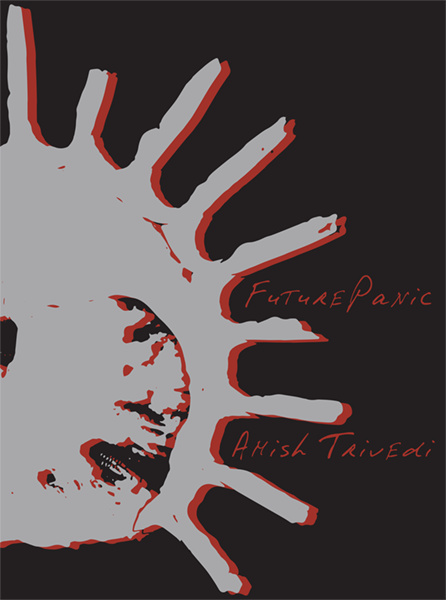
FuturePanic
Amish Trivedi
2021, Perfect Bound Trade Paperback, 6" x 8"
Sweeping and subversive and anxious and heartfelt, FuturePanic by Amish Trivedi is a Four Quartets for the Millennial set. Infused with the nervous energies of the past half decade, when living with macro-tragedy and dread have become more ingrained in day-to-day functioning than ever, Trivedi's third book of poetry employs a deliberate and plaintive lyric mode across five unfolding sections to wrestle with how much of the psyche one can let untether before the self faces annihilation. The poet confronts the gathering terrors that creep forth from simultaneously pondering vast, heady concepts like time and futurity in conjunction with more localized, proximate concerns like whether one will face the looming specter of a mass shooting the next time one goes to a box store, concert, movie theater, grocery store, school, or other public space. In FuturePanic, Trivedi questions whether the collective grief and guilt of our shared transgressions and fears are all-consuming or if we can use humanity's boundless potential for creativity to rouse an alternative we've never known enough of to embrace fully—a moment's peace.
An uncanny catalogue of time anxieties, the event horizon of history, our limited access to infinity. The future is "a hard limit," "a kind of oppression," "a siren," "a fetish"; it is "not ours." FuturePanic is an ode to the ruins of us, an elegy for the present.
—Elisa Gabbert
Amish Trivedi's FuturePanic settles on a moving and innerved psychic lens that steadies a gaze on a state of the world and the self as they forge meaning. "The future is a hard limit, the arc of history long enough that no one here will ever see enough of it" is a central question of these measured, oracular utterances. So many territories of conception are unpacked with a deep lyric intensity. I'm moved by Trivedi's ability to situate us in this intersection of knowledge, futurity, and vibrance.
—Prageeta Sharma
What is panic? The beautiful sobering poetry of Trivedi's latest book—I find a soothing reassurance in his ability to carefully examine what we face as humans during our recurring catastrophes. Call it history, call it fate, call it the result of our collective sins—facing time is admirable. It's a beginning. "I assemble you, call you into being, my baby universe."
—Nikki Wallschlaeger
